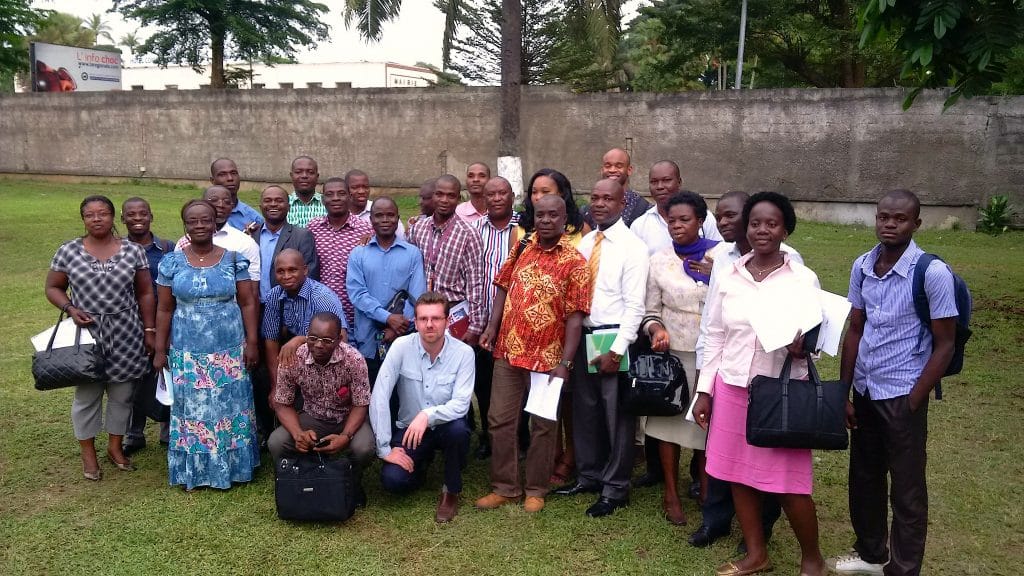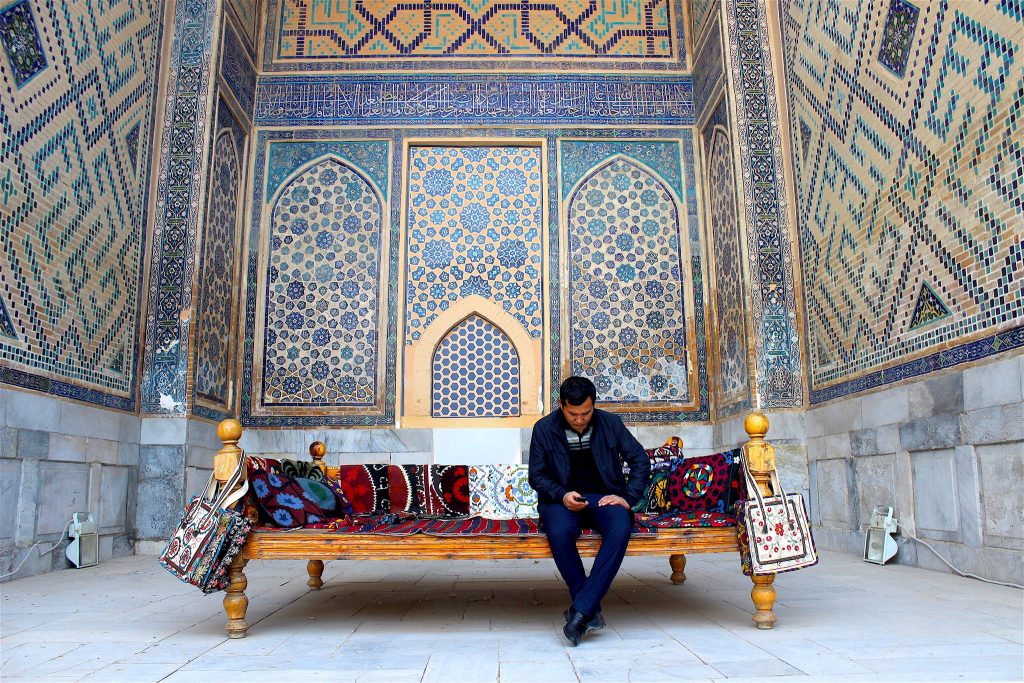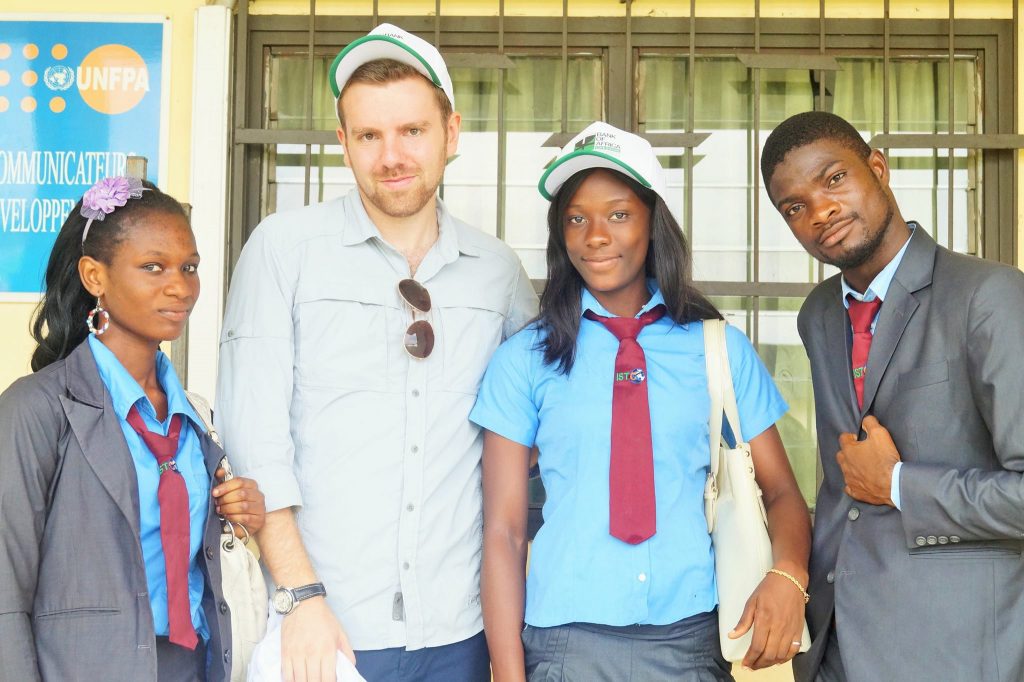
The English Language Fellow Program, sponsored by the U.S. State Department, promotes English language learning and international diplomacy around the world. The ten-month program places highly qualified educators in various regions around the world to serve as full-time English language teachers for college students and professionals. Fellows typically have a Master’s degree in TEFL/TESL or Applied Linguistics and receive a stipend, roundtrip travel, and benefits during their time abroad.
We talked to John Simpson, a twice-over English Language Fellow first to Abidjan, Côte d’Ivoire in 2014-5 and then, two years later, to Tashkent, Uzbekistan. He gave us some great insights into the program and helpful application tips!
1. What inspired you to apply for the English Language Fellowship each time?
My academic background is in both international studies and TESOL, so the English Language Fellowship (ELF) program was perfect for me as it aligned with my career interests. I first learned about the ELF program in grad school, and I was pushing the boundaries of ineligibility. I didn’t quite have enough experience. I was told that the program valued international teaching experience, so I applied to a separate fellowship at the Asian University for Women in Bangladesh. That provided me with the requisite experience necessary to apply for the ELF program.
Each time I applied to the English Language Fellowship program I was inspired by the challenge of the work. I knew it would be challenging, and I wanted to face a known challenge head-on. I knew that navigating life in another language, in another place with different cultural norms and a different history would be challenging in and of itself. I think at the time I was searching for a certain kind of independence that I wanted to earn through hard work, patience, and commitment to service. I also knew it would be rewarding, just by the nature of the work and all the things I would learn and experience, professionally and personally. So, my inspiration came from a desire to do something that I knew would be difficult – something different.

2. What have been some of the most eye-opening moments during your fellowship experiences?
Some of the most eye-opening experiences have been regarding hospitality – the hospitableness of the people in the community where I lived and worked and called home. Of course, there are literal eye-opening moments like seeing the giant Basilica replica in the Ivory Coast, or the ancient madrassas of Samarkand, Uzbekistan. Personally, my most eye-opening moments were my most mouth-watering moments – the food. Both day-to-day and infinitely memorable, these experiences were some of the best.
Inside the classroom, I remember feeling both empowered and overwhelmed by the opportunity and challenges before me. There was a lot of ambiguity sometimes, but that’s all part of the experience. The ELF program is particularly interesting because fellows work with both host institutions in-country and the local US embassy. But my favorite times were watching students getting excited about learning. For example, we would play these English language board games that the State Department had created, and the students would just crowd around and be so interested. That was fun to see – sincere interest in learning. That was powerful.

3. What tips would you give others applying to the English Language Fellowship?
The English Langauge Fellowship program likes to see international teaching experience and a TESOL certification of some kind. I would encourage fellows who meet the eligibility requirements to apply as soon as possible because the program is growing. Also, if you are available for worldwide placement, this is also an asset.
Fellows need to be flexible, independent, and resourceful to thrive in what can be challenging conditions. Applications demonstrate dedication to international service and the ability to strengthen cultural ties, promote the English language, and show initiative will be strongest. To make your application stand out, highlight any international experience, languages known, teaching qualifications, and cultural interests.
There are also Alumni Ambassadors for the program who can answer any questions about the program or their experience as a fellow. Good luck!
John Simpson was an English Langauge Fellow in Africa and Central Asia, a William J. Clinton Fellow for Service in India with the American India Foundation (AIF), and an Asian University for Women (AUW) Senior Fellow in Bangladesh. John is currently the Director of the English Speaking Nation Project with the American Councils for International Education in Uzbekistan, aiming to build national teacher-training and certification programs. John earned his master’s degrees in International Studies and TESOL from the University of Washington and Seattle University, respectively. He enjoys reading, traveling, and eating potentially dangerous street food.
Interested in applying? Bookmark the English Language Fellow Program to your ProFellow account.
© Victoria Johnson 2020, all rights reserved.